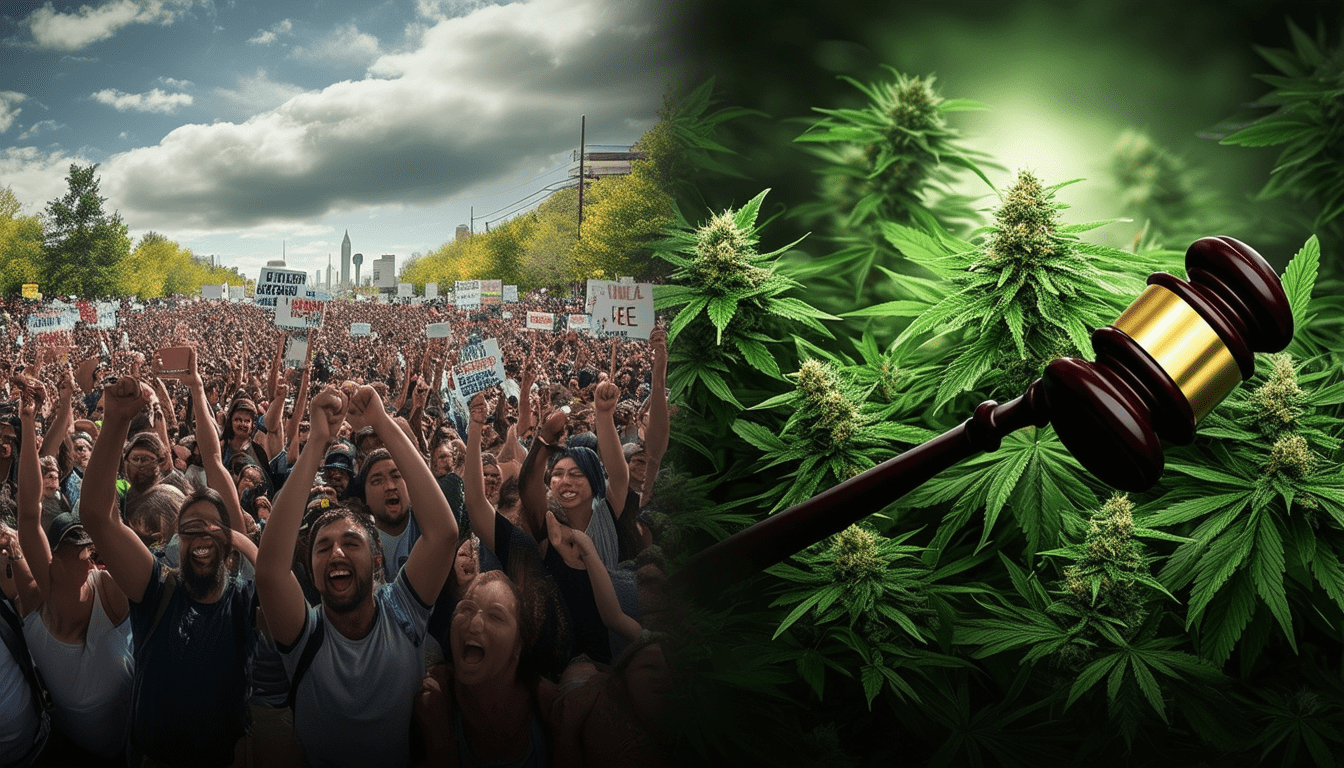Marijuana Legalization Hits a Stalemate in Conservative States That Continue to Criminalize Users
|
IN BRIEF
|
The movement for marijuana legalization has encountered significant roadblocks in conservative states, where the legal landscape remains hostile towards cannabis users. Despite increasing public support and growing recognition of the benefits of legalization, states like Florida, North Dakota, and South Dakota have repeatedly rejected proposals to legalize recreational use. As policymakers grapple with the ramifications of these failures, the future of cannabis reform hangs in the balance, suggesting a troubling impasse that hinders progress and perpetuates the stigma around users. The ongoing resistance not only reflects a deep-rooted cultural divide but also raises critical questions about the overall direction of the legalization movement amidst shifting political tides.

The ongoing battle for marijuana legalization faces significant challenges, particularly in conservative states that persist in criminalizing users. Recent electoral outcomes reveal that efforts to legalize cannabis, even in the face of growing public support, are stymied by entrenched political systems. With key initiatives failing to pass in states like Florida, North Dakota, and South Dakota during the November 2024 elections, advocates are left grappling with the future direction of the legalization movement in areas resistant to change.
The Recent Setbacks for Legalization Efforts
November 5, 2024, was a harsh day for proponents of cannabis legalization as multiple ballot measures fell short. In states such as Florida, North Dakota, and South Dakota, attempts to legalize recreational use were outright defeated. Moreover, while two medical measures did succeed in Nebraska, ongoing legal disputes threaten their validity, further complicating the landscape of cannabis legislation.
The Red Wall and Its Challenges
The concept of the “red wall” is crucial to understanding the challenges faced by marijuana legalization advocates. This term refers to the twenty states where Republican dominance prevents the legalization of recreational cannabis. Additionally, states such as Kansas, Wisconsin, Kentucky, and North Carolina—who might be termed “red wall adjacent”—feature Democratic governors but Republican-controlled legislatures, creating additional hurdles for those wishing to see change. The perpetual alignment of political power in these regions illustrates the difficulty in shifting the public narrative around cannabis, especially when support for legalization is significantly lower among Republican constituents compared to Democrats.
Public Sentiment vs. Political Will
Despite growing acceptance of marijuana use among the general public, reaching a majority consensus in support of legalization proves difficult in these conservative landscapes. In North and South Dakota, repeated attempts to pass legalization measures have met with failure, casting doubt on whether advocates will invest further resources into this approach. In the case of Florida, the recent attempt to legalize recreational cannabis received around 56 percent of voter approval, yet fell short of the required 60 percent threshold, demonstrating the uphill battle endeavoring to surpass not just public opinion but legislative barriers as well.
Federal Politics and Its Impact on State Measures
The recent electoral landscape indicates a favorable outcome for Republicans, with former President Donald Trump reclaiming prominence in the political arena. As Trump regains power, his previously stated support for cannabis legislation, focusing on regulatory frameworks and decriminalization, could shape future discussions. Yet, since cannabis has not been prioritized in past campaigns, its future remains uncertain amid the political agenda.
Even if the federal rescheduling process, initiated under President Joe Biden, proceeds to reclassify cannabis further down the schedule, it will not necessarily lead to smooth paths for legalization at the state level. Observers indicate that moving cannabis to Schedule III may complicate regulation, creating a scenario where it becomes more controlled and thus less accessible, potentially undercutting the grassroots push for legalization.
The Future of the Legalization Movement
With the legalization movement reaching an apparent deadlock in conservative states, advocates must reassess their strategy moving forward. The ballot initiative process, often seen as a crucial means to circumvent antilegalization officials, is proving less effective in these areas. Legal challenges, as seen in South Dakota and Nebraska, highlight the extent to which state officials may resist implementing measures, even if they successfully pass voter approval.
The failed initiative in Arkansas reinforces the broader challenges, as it sought to enhance medical access while introducing a contingency that would allow for recreational use upon federal legalization. However, due to mislabeling and a lack of clarity, the Arkansas Supreme Court deemed it misleading, preventing the votes from being counted—a fate that illustrates the precariousness of navigating legislative channels amidst significant pushback.
The road ahead suggests that supporters of legalization will need to remain vigilant, strategically reassessing their positions in light of shifting political tides and public sentiment. Understanding how to prioritize efforts and create effective strategic alliances is critical for breathing new life into the stalled cannabis legalization conversation.
To support cannabis advocacy journalism and stay informed, consider engaging with resources like Marijuana Moment.
Comparative Analysis of Marijuana Legalization Efforts in Conservative States
| State | Current Legal Status |
| Florida | Failed legalization measure despite majority public support, needing 60% to pass. |
| North Dakota | Recreational measure defeated for the third consecutive time. |
| South Dakota | Recreational measure rejected after prior attempts, indicating persistent resistance. |
| Arkansas | Failed medical expansion initiative; misleading title led to disqualification of votes. |
| Nebraska | Two medical measures passed but face legal challenges regarding signature validity. |
| Kansas | No recreational measures; slow progress on medical cannabis legislation. |
| Wisconsin | Recreational and medical legalization remain stalled due to legislative opposition. |
| Pennsylvania | Potential shift possible if Republicans lose majority in House; currently red wall adjacent. |
| Public Support | Overall support for marijuana legalization remains high, but lower among Republicans compared to Democrats. |

The fight for marijuana legalization in conservative states is at a standstill, with recent ballot measures failing despite widespread public support. The resistance from state governments, particularly in Republican-controlled areas, continues to hinder progress, fueling debates about the future of cannabis legislation in the U.S. This article explores the current challenges, recent failures, and implications for activists advocating for change in the landscape of marijuana policy.
Recent Failures in Cannabis Legislation
Recent elections have revealed the stark reality of the cannabis legalization movement. Ballot initiatives in Florida, North Dakota, and South Dakota have all come up short, raising questions about the path forward for proponents of cannabis reform. Even when efforts are made to appease voters through potential medical measures, such as those seen in Nebraska, challenges ensue as legal disputes arise over signature validity.
The Impact of Political Climate
In the U.S., a significant divide persists between states led by Republican officials and those governed by Democrats. As the “red wall” solidifies, policies regarding marijuana become increasingly polarized. States like Kansas, Wisconsin, Kentucky, and North Carolina, while not entirely red, exhibit a reluctance due to predominant Republican control. A recent poll has indicated voters in Kansas show strong support for legalization, yet legislative action remains stagnant due to prevailing political opposition.
The Challenge of Public Perception
The public’s perception of marijuana is shifting, with approximately 70% of Americans favoring legalization. However, in conservative strongholds, these sentiments do not translate into actionable policies. In Florida, a well-supported measure failed to secure the necessary 60% approval required by state law, receiving only about 56% of the vote. This disconnect illustrates how well-meaning initiatives can falter at the ballot box due to arcane regulations and political maneuvering.
Awaiting Federal Influence
The upcoming political climate regarding cannabis might also be affected by trends at the national level. With former President Donald Trump’s return to the White House, analysts speculate whether his previous support for some cannabis measures will find a more prominent place in his agenda. However, his tepid endorsement coupled with the lackluster support for legalization within the Republican Party suggests that substantial shifts in policy may remain elusive.
Future Strategies for Advocates
As the legalization movement reflects on recent electoral failures, the importance of alternative strategies becomes more apparent. The processes that once proved effective for advocacy are not as viable in conservative territories. Activists may need to rethink their approach, particularly in adapting messages that resonate with voters who remain unconvinced about recreational cannabis while favoring medical use. Advocates should explore innovative means of advocacy, such as focusing on the economic benefits of legalization and public health improvements drawn from regulated cannabis access, as seen in ongoing discussions regarding the health benefits of cannabis.
- Current Status: Stalemate in conservative states on marijuana legalization.
- Failed Ballot Initiatives: Recreational legalization measures rejected in several states.
- Public Support: Majority support for legalization, but high requirements for approval.
- Red Wall: 20 states under full Republican control maintaining strict cannabis laws.
- Medical Cannabis: Some medical measures passed but face legal challenges.
- Political Climate: Republican dominance complicating legalization efforts.
- Voter Dynamics: Support for cannabis much lower among Republicans.
- Future Uncertainties: Lack of clarity on next steps post-elections.
- Judicial Roadblocks: Court rulings impacting the counting of votes on cannabis measures.
- Federal Consideration: Uncertain federal rescheduling process affecting state laws.
The effort to legalize marijuana in conservative states is currently facing significant challenges, particularly after a series of failed ballot initiatives in states like Florida, North Dakota, and South Dakota. Despite public support for cannabis legalization, locally entrenched political structures, combined with ongoing legal hurdles, continue to pose resistance. This landscape prompts a need to explore effective strategies for advocates to navigate the complex reality of marijuana usage laws in these jurisdictions, where criminalization remains prevalent.
Understanding the Political Context
In many conservative states, the interplay between political ideologies and public policy creates a formidable barrier to legalization efforts. The term “red wall” encapsulates the phenomenon where a significant number of states, particularly those with Republican dominance, prohibit recreational cannabis despite shifting public sentiments. Advocates must understand this landscape, including the lower levels of support among Republican constituencies, to tailor their strategies accordingly.
Engaging Local Communities
One of the most effective strategies for advancing marijuana legalization is grassroots engagement within local communities. Mobilizing community support through educational campaigns can foster a broader understanding of the benefits of legalization, thereby influencing public opinion. Organizers should focus on highlighting positive anecdotes from states that have legalized marijuana, especially concerning economic benefits and public health outcomes.
Leveraging Public Health Data
Utilizing scientific and public health data can play a pivotal role in reframing the narrative around marijuana use. Advocates should gather and disseminate research that underscores the safety and therapeutic benefits of cannabis. Highlighting studies that demonstrate reduced opioid dependency in states with legal cannabis can provide compelling evidence to sway skeptical lawmakers.
Formulating Legal Strategies
Legal approaches must also be considered for effective advocacy. Developing well-structured initiatives that clearly outline the desired changes while addressing any potential legal controversies is crucial. In states like Arkansas, recent failed initiatives illustrate how complex legal framing can mislead both voters and judges. Advocates should ensure that all ballot measures are straightforward and transparently communicate their intentions to avoid misleading interpretations.
Building Coalitions Across Political Lines
Creating coalitions that include a diverse range of stakeholders across the political spectrum can amplify advocacy efforts. This may involve partnering with organizations that focus on criminal justice reform, public health, and economic development. By presenting the issue of marijuana legalization as a multidimensional concern that includes benefits for various political factions, advocates can present a united front capable of garnering widespread support.
Utilizing Social Media and Digital Campaigning
The digital space has become an increasingly important venue for shaping public opinion and mobilizing support for marijuana legalization. Crafting strategic online campaigns that harness social media’s power can reach a broader audience and foster vibrant discussions. Advocates should engage influencers and utilize platforms to disseminate success stories, counter misinformation, and encourage grassroots movements.
Preparing for Legislative Changes
While recent political shifts may complicate the future of cannabis legislation, advocates should remain prepared to capitalize on any emerging opportunities. Monitoring developments in state legislatures and adjusting strategies in response to changing political landscapes will be vital. As seen in previous elections, public sentiment can rapidly shift, suggesting that remaining agile and responsive is crucial for success.





Post Comment